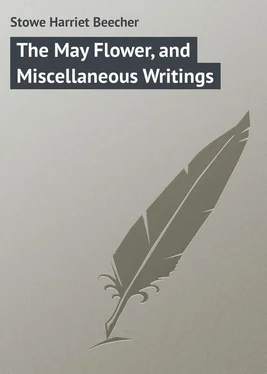Harriet Stowe - The May Flower, and Miscellaneous Writings
Здесь есть возможность читать онлайн «Harriet Stowe - The May Flower, and Miscellaneous Writings» — ознакомительный отрывок электронной книги совершенно бесплатно, а после прочтения отрывка купить полную версию. В некоторых случаях можно слушать аудио, скачать через торрент в формате fb2 и присутствует краткое содержание. Жанр: foreign_prose, на английском языке. Описание произведения, (предисловие) а так же отзывы посетителей доступны на портале библиотеки ЛибКат.
- Название:The May Flower, and Miscellaneous Writings
- Автор:
- Жанр:
- Год:неизвестен
- ISBN:нет данных
- Рейтинг книги:4 / 5. Голосов: 1
-
Избранное:Добавить в избранное
- Отзывы:
-
Ваша оценка:
- 80
- 1
- 2
- 3
- 4
- 5
The May Flower, and Miscellaneous Writings: краткое содержание, описание и аннотация
Предлагаем к чтению аннотацию, описание, краткое содержание или предисловие (зависит от того, что написал сам автор книги «The May Flower, and Miscellaneous Writings»). Если вы не нашли необходимую информацию о книге — напишите в комментариях, мы постараемся отыскать её.
The May Flower, and Miscellaneous Writings — читать онлайн ознакомительный отрывок
Ниже представлен текст книги, разбитый по страницам. Система сохранения места последней прочитанной страницы, позволяет с удобством читать онлайн бесплатно книгу «The May Flower, and Miscellaneous Writings», без необходимости каждый раз заново искать на чём Вы остановились. Поставьте закладку, и сможете в любой момент перейти на страницу, на которой закончили чтение.
Интервал:
Закладка:
Now, if you supposed, from all this triangularism of exterior, that this good man had nothing kindly within, you were much mistaken. You often find the greenest grass under a snowdrift; and though my uncle's mind was not exactly of the flower garden kind, still there was an abundance of wholesome and kindly vegetation there.
It is true, he seldom laughed, and never joked himself; but no man had a more serious and weighty conviction of what a good joke was in another; and when some exceeding witticism was dispensed in his presence, you might see Uncle Abel's face slowly relax into an expression of solemn satisfaction, and he would look at the author with a sort of quiet wonder, as if it was past his comprehension how such a thing could ever come into a man's head.
Uncle Abel, too, had some relish for the fine arts; in proof of which, I might adduce the pleasure with which he gazed at the plates in his family Bible, the likeness whereof is neither in heaven, nor on earth, nor under the earth. And he was also such an eminent musician, that he could go through the singing book at one sitting without the least fatigue, beating time like a windmill all the way.
He had, too, a liberal hand, though his liberality was all by the rule of three. He did by his neighbor exactly as he would be done by; he loved some things in this world very sincerely: he loved his God much, but he honored and feared him more; he was exact with others, he was more exact with himself, and he expected his God to be more exact still.
Every thing in Uncle Abel's house was in the same time, place, manner, and form, from year's end to year's end. There was old Master Bose, a dog after my uncle's own heart, who always walked as if he was studying the multiplication table. There was the old clock, forever ticking in the kitchen corner, with a picture on its face of the sun, forever setting behind a perpendicular row of poplar trees. There was the never-failing supply of red peppers and onions hanging over the chimney. There, too, were the yearly hollyhocks and morning-glories blooming about the windows. There was the "best room," with its sanded floor, the cupboard in one corner with its glass doors, the ever green asparagus bushes in the chimney, and there was the stand with the Bible and almanac on it in another corner. There, too, was Aunt Betsey, who never looked any older, because she always looked as old as she could; who always dried her catnip and wormwood the last of September, and began to clean house the first of May. In short, this was the land of continuance. Old Time never took it into his head to practise either addition, or subtraction, or multiplication on its sum total.
This Aunt Betsey aforenamed was the neatest and most efficient piece of human machinery that ever operated in forty places at once. She was always every where, predominating over and seeing to every thing; and though my uncle had been twice married, Aunt Betsey's rule and authority had never been broken. She reigned over his wives when living, and reigned after them when dead, and so seemed likely to reign on to the end of the chapter. But my uncle's latest wife left Aunt Betsey a much less tractable subject than ever before had fallen to her lot. Little Edward was the child of my uncle's old age, and a brighter, merrier little blossom never grew on the verge of an avalanche. He had been committed to the nursing of his grandmamma till he had arrived at the age of in discretion, and then my old uncle's heart so yearned for him that he was sent for home.
His introduction into the family excited a terrible sensation. Never was there such a condemner of dignities, such a violator of high places and sanctities, as this very Master Edward. It was all in vain to try to teach him decorum. He was the most outrageously merry elf that ever shook a head of curls; and it was all the same to him whether it was " Sabba' day " or any other day. He laughed and frolicked with every body and every thing that came in his way, not even excepting his solemn old father; and when you saw him, with his fair arms around the old man's neck, and his bright blue eyes and blooming cheek peering out beside the bleak face of Uncle Abel, you might fancy you saw spring caressing winter. Uncle Abel's metaphysics were sorely puzzled by this sparkling, dancing compound of spirit and matter; nor could he devise any method of bringing it into any reasonable shape, for he did mischief with an energy and perseverance that was truly astonishing. Once he scoured the floor with Aunt Betsey's very Scotch snuff; once he washed up the hearth with Uncle Abel's most immaculate clothes brush; and once he was found trying to make Bose wear his father's spectacles. In short, there was no use, except the right one, to which he did not put every thing that came in his way.
But Uncle Abel was most of all puzzled to know what to do with him on the Sabbath, for on that day Master Edward seemed to exert himself to be particularly diligent and entertaining.
"Edward! Edward must not play Sunday!" his father would call out; and then Edward would hold up his curly head, and look as grave as the catechism; but in three minutes you would see "pussy" scampering through the "best room," with Edward at her heels, to the entire discomposure of all devotion in Aunt Betsey and all others in authority.
At length my uncle came to the conclusion that "it wasn't in natur' to teach him any better," and that "he could no more keep Sunday than the brook down in the lot." My poor uncle! he did not know what was the matter with his heart, but certain it was, he lost all faculty of scolding when little Edward was in the case, and he would rub his spectacles a quarter of an hour longer than common when Aunt Betsey was detailing his witticisms and clever doings.
In process of time our hero had compassed his third year, and arrived at the dignity of going to school. He went illustriously through the spelling book, and then attacked the catechism; went from "man's chief end" to the "requirin's and forbiddin's" in a fortnight, and at last came home inordinately merry, to tell his father that he had got to "Amen." After this, he made a regular business of saying over the whole every Sunday evening, standing with his hands folded in front and his checked apron folded down, occasionally glancing round to see if pussy gave proper attention. And, being of a practically benevolent turn of mind, he made several commendable efforts to teach Bose the catechism, in which he succeeded as well as might be expected. In short, without further detail, Master Edward bade fair to become a literary wonder.
But alas for poor little Edward! his merry dance was soon over. A day came when he sickened. Aunt Betsey tried her whole herbarium, but in vain: he grew rapidly worse and worse. His father sickened in heart, but said nothing; he only staid by his bedside day and night, trying all means to save, with affecting pertinacity.
"Can't you think of any thing more, doctor?" said he to the physician, when all had been tried in vain.
"Nothing," answered the physician.
A momentary convulsion passed over my uncle's face. "The will of the Lord be done," said he, almost with a groan of anguish.
Just at that moment a ray of the setting sun pierced the checked curtains, and gleamed like an angel's smile across the face of the little sufferer. He woke from troubled sleep.
"O, dear! I am so sick!" he gasped, feebly. His father raised him in his arms; he breathed easier, and looked up with a grateful smile. Just then his old playmate, the cat, crossed the room. "There goes pussy," said he; "O, dear! I shall never play any more."
At that moment a deadly change passed over his face. He looked up in his father's face with an imploring expression, and put out his hand as if for help. There was one moment of agony, and then the sweet features all settled into a smile of peace, and "mortality was swallowed up of life."
Читать дальшеИнтервал:
Закладка:
Похожие книги на «The May Flower, and Miscellaneous Writings»
Представляем Вашему вниманию похожие книги на «The May Flower, and Miscellaneous Writings» списком для выбора. Мы отобрали схожую по названию и смыслу литературу в надежде предоставить читателям больше вариантов отыскать новые, интересные, ещё непрочитанные произведения.
Обсуждение, отзывы о книге «The May Flower, and Miscellaneous Writings» и просто собственные мнения читателей. Оставьте ваши комментарии, напишите, что Вы думаете о произведении, его смысле или главных героях. Укажите что конкретно понравилось, а что нет, и почему Вы так считаете.












